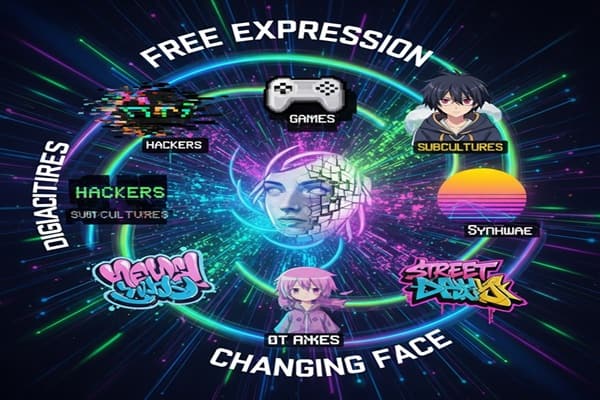
The digital era has completely redefined how we communicate, create, and express ourselves. Once, the internet was simply a space to share information. Now, it’s a living, breathing ecosystem where personal expression, entrepreneurship, and culture collide in fascinating ways.
Among the most thought-provoking trends is the rise of digital empowerment — individuals using social platforms not just for connection but as vehicles for creativity, identity, and livelihood. Whether through art, advocacy, or small business, the online world has become a stage for human potential.
But this evolution also raises deeper questions. Who controls digital expression? How do algorithms, censorship, and policies shape what voices are heard — and which are silenced? And where does the balance lie between freedom, responsibility, and safety in online spaces?
Let’s explore these questions through five key insights that reveal how digital culture is reshaping empowerment, communication, and identity.
1. The Rise of Digital Expression as a Form of Identity
Over the past two decades, online platforms have become extensions of who we are. From social media profiles to creative portfolios and personal blogs, digital identity has turned into a blend of self-expression and storytelling.
People no longer see online spaces as separate from “real life.” Instead, these platforms act as mirrors — reflecting values, experiences, and emotions. Social identity has evolved from being defined by location or background to being shaped by digital footprints and creative participation.
For creators, the internet provides tools to showcase individuality without traditional gatekeepers. Artists can reach global audiences. Writers can build communities around shared ideas. Even small brands can cultivate loyal followers who believe in their mission.
Yet this empowerment comes with a trade-off. The very platforms that amplify expression also set the boundaries. Algorithms decide which voices trend and which fade. Digital visibility becomes not just a measure of creativity, but also a reflection of how one navigates the ever-changing mechanics of online culture.
2. Platform Freedom and the Challenge of Censorship
The freedom to share online has always been one of the internet’s defining features. But as platforms have grown, so have their responsibilities. Every platform now walks a fine line between freedom of expression and content moderation — a balance that affects millions of users daily.
On one side, open expression fuels innovation and creativity. It allows people to discuss taboo topics, challenge authority, or simply be authentic. On the other, unregulated spaces can enable misinformation, harassment, or exploitation.
Platforms like Twitter (now X), Reddit, and TikTok have repeatedly revised their content policies to address safety concerns and advertiser demands. But frequent policy shifts often leave creators uncertain about what’s allowed. A single update can change how an entire community functions — sometimes silencing valuable voices in the process.
Digital-rights experts often describe this as “the algorithmic chokehold” — where invisible systems decide what’s visible, not based on quality or ethics, but on engagement metrics and brand safety. The result? A constant tension between human creativity and machine-driven control.
To build a truly open digital culture, transparency and accountability must evolve alongside innovation. Users deserve to understand how their content is ranked, moderated, and monetized.
3. The Creator Economy: Redefining Work and Value
One of the most remarkable transformations of the past decade is the rise of the creator economy. Millions of individuals — from educators and artists to fitness coaches and commentators — have turned their skills and passions into income streams.
This economy thrives on authenticity and community. Audiences don’t just follow creators for content; they follow them for connection. Trust becomes currency. Engagement becomes opportunity.
However, the business of creation is not as effortless as it may appear. Behind every viral post is strategy, consistency, and emotional labor. Many creators juggle content planning, branding, and audience management — essentially running one-person media companies.
The challenge lies in sustainability. Algorithms favor constant output, leading to burnout and anxiety among creators. Monetization models also remain unstable, with revenue often tied to platform rules or ad performance.
Still, this new economy has democratized opportunity. It has allowed people from all walks of life to earn a living doing what they love. The key to its future success lies in empowering creators with fair compensation, platform transparency, and digital literacy.
4. The Sociology of Online Empowerment and Community
Beyond business and visibility, online spaces have become social laboratories for empowerment. They enable people to build communities around shared goals, values, and struggles.
Movements such as #MeToo, #BlackLivesMatter, and #ClimateAction showed how collective voices can spark real-world change. What began as online conversations evolved into global movements — proving that digital dialogue has tangible power.
But empowerment is not limited to activism. Everyday communities — book lovers, language learners, hobbyists, or wellness enthusiasts — demonstrate how connection fosters confidence. The ability to share experiences and receive validation has redefined how people see themselves.
Social scientists note that this new form of digital participation encourages empathy and inclusivity. However, it also introduces new hierarchies — those who master visibility wield more influence. As such, digital empowerment is both a right and a skill, one that must be cultivated with awareness and responsibility.
5. The Future of Free Expression in the Digital Age
The future of digital freedom will be shaped by technology ethics, decentralization, and user control. As AI moderation tools and platform policies continue to evolve, the conversation around who owns our digital voices will only grow louder.
Experts predict the rise of decentralized social networks — platforms where users control their data and content without corporate oversight. These systems could promote transparency and reduce censorship risks, offering creators greater autonomy.
Meanwhile, global policymakers are drafting new frameworks around digital rights, data privacy, and algorithmic accountability. These discussions will determine how future generations experience freedom online.
For individuals, the takeaway is clear: the future of digital empowerment depends on informed participation. Knowing how algorithms, terms of service, and data systems operate is no longer optional — it’s essential.
Also Read : The Future of the Web: Understanding Bynethi com and Its Place in Digital Culture
Bringing It All Together: The Digital Culture We’re Building
At its heart, digital culture is about connection — human stories woven through technology. It reflects both our creativity and our contradictions: the desire for expression and the need for protection, the pursuit of independence and the reality of systemic control.
Online empowerment is not a destination but a dialogue. Every tweet, video, or post adds to the collective story of how society navigates modern freedom.
Whether you’re a content creator, a casual user, or a digital policy observer, the message is the same: the internet is what we make of it. The choices we make — how we communicate, support others, and advocate for transparency — will define whether the web remains a tool for liberation or becomes a machine of conformity.
Final Thoughts: Toward a More Conscious Digital Future
As technology continues to evolve, so must our understanding of freedom and responsibility. The platforms we use daily are more than products; they’re social spaces that shape thought, creativity, and community.
Building a more conscious internet means prioritizing ethics, empathy, and empowerment. It means listening to marginalized voices, supporting creators fairly, and holding tech companies accountable.
The future of digital identity doesn’t belong to algorithms or corporations — it belongs to people who use the web to tell stories, challenge norms, and build bridges.
If there’s one takeaway from the transformation of online culture, it’s this: true digital empowerment isn’t about algorithms or trends — it’s about agency. The freedom to speak, to create, and to connect authentically remains the most powerful currency of our time.
Frequently Asked Questions (FAQs)
1. What is digital empowerment?
Digital empowerment refers to individuals using technology and online platforms to express themselves, build communities, and create opportunities for growth and income.
2. How does censorship affect online freedom?
Censorship shapes what content is visible online. While it can protect users from harm, excessive moderation can also suppress creativity and limit free expression.
3. What is the creator economy?
The creator economy is a digital marketplace where individuals monetize their content, skills, or influence through platforms like YouTube, Substack, Patreon, or TikTok.
4. Why is algorithmic transparency important?
Algorithms determine which content gets exposure. Transparency helps users understand these systems and ensures fairness in digital visibility.
5. What’s next for digital culture?
Expect to see more decentralized, community-driven platforms that prioritize privacy, inclusivity, and user control — shifting power from corporations back to individuals.


